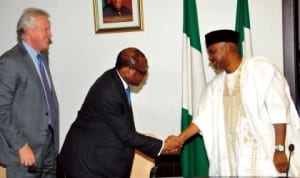Oil & Energy
Twists, Turns Of PHCN Privatisation
Thousands of former staff
of the Power Holding Company of Nigeria (PHCN) recently, besieged the zonal office of the company along Moscow Road in Port Harcourt, in desperate move to prove their originality and get captured in the last biometric revalidation exercise.
Leader of a team of verification officers from the Bureau of Public Enterprises (BPE), told journalists that the exercise was designed to accommodate staff who were not captured in previous verification exercises and who were unable to get their terminal benefits which is an integral aspect of the privatisation of PHCN.
In the crowd were some pensioners in their seventies cladding their original documents much older than PHCN itself as they were employed by the National Electric Power Authority (NEPA) that transformed to PHCN. They came from different parts of the country to Port Harcourt for the exercise.
Mr Sunday Nnadi who said he came all the way from Arochukwu had spent three days yet, he did not see any hope of getting through. “All the officers do is asking me to fill one form after the other. It is becoming endless,” Nnadi said.
Another staff said, “I put in 35 years serving this company and the only way to thank or appreciate my efforts is to suffer me like this”, said an old ex-staff who simply gave his name as John.
“Imagine, some of us come from Ondo, Enugu, Edo, Lagos, Katsina, but we had been stranded here for the past three years with the government people turning us to beggers,” he continued.
A former executive member of the National Union of Electricity Employees (NUEE), Rivers State branch, who also came for the exercise querried if the privatization of PHCN was made to bring sorrow to former staff of the firm.
According to him, the present verification is the sixth time workers were being subjected to the exercise, yet to no avail, as many of them were yet to receive their terminal package.
The former exco member of NUEE accused the new investors of sacking virtually all the NUEE executive members because of the unions insistence on members’ welfare.
“They targeted us even when a good number of us have enviable records of service and laid us off while re-engaging others. This is unfair,” he noted.
Responding to the allegation of inhuman treatment of staff and witch hunting of ex-unionists, the BPE team leader said the staff, especially those from Enugu zone, had refused to cooperate and were unruly thereby making the exercise chaotic.
He also said that people were taking undue advantage of the verification to defraud the system.
“About 86,000 PIN numbers have been presented by PHCN workers who were less than 50,000 even when each was expected to present one PIN Number only.
He also said there were cases of different persons claiming to be next of kin of some dead staff and that it created confusion and delay.
“The problem is not from the team but from the workers themselves,” said the BPE official.
He further said fraudsters and imposters were desperately adding to the whole situation revealing that two impostors had been arrested.
He stated that the team was made up of representatives from NUEE, BPE, National Union of Pensioners, Pencom, State Security services, PHCN headquarters, Nigeria Electricity Liability Management Companies, Ministry of Power, Senior Staff Union. “The essence is to make it a one-stop shop as there are different bodies to handle various issues and claims,” he added.
He explained that the new investors were to buy PHCN without any liability and that many retirees were not paid by PHCN before the verification, so BPE is also compiling the authentic list as to enable government clear the payment and that such new challenges were not foreseen earlier.
Restating the Federal Government’s determination to clear all backlog of arrears, he said so far about N361 billion has been paid to ex-PHCN staff.
Another source of the challenges facing the team, according to the leader was the way things were being run in the company. “We have NEPA I and NEPA II. The NEPA II staff were employed by staff of PHCN to assist them in the field, at the end of the month they received about N5000, or N10,000 and we are also handling the complex situation.
He assured that at last, all will get fair treatment from the team and particularly noted that he was not aware of any witchhunting of any former staff as a result of his or her role in the union that championed staff welfare in the past.
The critical state of power had remained a major concern and both the government and a cross-section of Nigerians are of the opinion that if the power sector was fixed, it would impact on the socio-economic wellbeing of Nigerians irrespective of class, place or occupation.
In adherence to this, Federal Government under past administrations had taken steps to revive the sector but efforts were frustrated by many factors.
The past administration under President Olusegun Obasanjo, started early by appointing Bola Ige, who was suddenly killed and the death of Bola Ige affected Obasanjo effort until recently, the present administration under Dr Goodluck Jonathan approached the problem through privatization.
In a bid to achieve, a former Minister of Power, Prof Bart Nnaji, was disgraced our of office mainly because of the dogged fight by NUEE which accused Nnaji of attempting to buy off the sector with his cronies from inside and outside the country.
Though President Jonathan had no option than to sack Prof Nnaji. Sincerely, the exit of Nnaji had not removed the hitches mounting on the privatisation process of the national power company.
Just last week, power consumers in Azikiwe Street in Port Harcourt, gathered in their numbers at the Port Harcourt Electricity Distribution Company, Diobu Business Unit to lay a complaint over poor supply and arbitrary billing.
Though, the group could not meet the Diobu Business Unit Manager, but according to them, a senior staff in the manager’s office told them to go and pay their bill first before complaining stressing that was the new order.
Investigation has also shown that the newly re-engaged staff of PHCN in the new firm were working in fears and that the system has become different from what it used to be when they were with PHCN as government parastatal.
One of the staff said as their six months probation period is fast coming to an end, they do not know their fate.
Irrespective of your posting or level, it is mandatory now that you sign the attendance register daily on resumption between 7:30 and 8am and closing time at 5pm,” he said adding that “it does not matter whether you were in the field or office, you must first get to the office in the morning to sign and return to the office to sign off at closure.
Another lady at Rumuola Business unit narrated some experience. “My brother, the beat has changed and, like it or not, you must change your dancing step to ryme with the new rhythm or you are in trouble,” she said.
She said the reengaged staff work under fear and great uncertainty and most times she remains in office till evening and must not complain or ask for extra pay.
But Mr Clement Jacob, a business consultant faulted the approach of the new investors. “The maxim is that you must give the new workers new orientation to enable them work towards your new vision otherwise, you ought not to blame the workers.
Jacob is of the view that since the ex-PHCN staff were given the civil service orientation, there was need to re-orientate them through some short time training and seminars where the new investors should guide the staff along their new mission as to meet target and succeed at last.
He said it is unfair to subject the new staff to new strategy without preparing them for that.
“In business management, such procedure is unacceptable and it is unfair to punish them.”
The aim of the privatisation, according to Jacob, who runs Matrix Business consult in Port Harcourt, is to achieve improvement in power supply for Nigerians to enable the business environment become better.
He, however, stressed that the staff ought to work with happiness and clearly defined targets to enable the private investors make their profit, “but with the way they are going, I am afraid if they would not meet hitches,” he added.
But Prince Emmanuel Ogba, it is too early to assess the new investors. All must join hands with them to succeed because their success would reflect in improved services.
He remarked that if the new privatization strategy fails, it is not the failure of the private investors but that of Nigeria and called for understanding and collaboration of all in Nigeria even as he advised the power investors to be open to Nigeria.
Prince Ogba urged the new investors to integrate the masses in their operations because of the multidisciplinary nature of the sector and suggested a lot of awareness campaign from the investors at workers’ level and masses or consumers levels.
“It is natural that consumers will complain if the services are not encouraging so the new investors should be proactive and give their strategic staff modern training to meet the new challenges,” he continued.
But to Mrs Joyce Oriji, a cold room operator, “Nigeria is going no where without fixing power. We can fail in leadership but if we get the power sector right so many things would fall into good shape”, she said.
To arrest the problem of irrational and arbitrary billing, some power watchers expressed the view that card system should be adopted as it is done in the telecommunication subsector.

L-R: Chairman, General Electric, Mr Jeffrey Immelt, Minister of Trade and Investment, Mr Olusegun Aganga and Vice President Namadi Sambo, during a meeting with officials of general electric in Abuja last Friday.
Photo: NAN
Chris Oluoh
Oil & Energy
FG Explains Sulphur Content Review In Diesel Production
The Federal Government has offered explanation with regard to recent changes to fuel sulphur content standards for diesel.
The Government said the change was part of a regional harmonisation effort, not a relaxation of regulations for local refineries.
The Chief Executive, Nigerian Midstream and Downstream Petroleum Regulatory Authority (NMDPRA), Farouk Ahmed, told newsmen that the move was only adhering to a 2020 decision by the Economic Community of West African States (ECOWAS) which mandated a gradual shift to cleaner fuels across the region.
Ahmed said the new limits comply with the decision by ECOWAS that mandated stricter fuel specifications, with enforcement starting in January 2021 for non-ECOWAS imports and January 2025 for ECOWAS refineries.
“We are merely implementing the ECOWAS decision adopted in 2020. So, a local refinery with a 650 ppm sulphur in its product is permissible and safe under the ECOWAS rule until January next year where a uniform standard would apply to both the locally refined and imported products outside West Africa”, Ahmed said.
He said importers were notified of the progressive reduction in allowable sulphur content, reaching 200 ppm this month from 300 ppm in February, well before the giant Dangote refinery began supplying diesel.
Recall that an S&P Global report, last week, noted a significant shift in the West African fuel market after Nigeria altered its maximum diesel sulphur content from 200 parts per million (ppm) to around 650 ppm, sparking concerns it might be lowering its standards to accommodate domestically produced diesel which exceeds the 200 ppm cap.
High sulphur content in fuels can damage engines and contribute to air pollution. Nevertheless, the ECOWAS rule currently allows locally produced fuel to have a higher sulphur content until January 2025.
At that point, a uniform standard of below 5 ppm will apply to both domestic refining and imports from outside West Africa.
Importers were previously permitted to bring in diesel with a sulphur content between 1,500 ppm and 3,000 ppm.
It would be noted that the shift to cleaner fuels aligns with global environmental efforts and ensures a level playing field for regional refiners.
Oil & Energy
PHED Implements April 2024 Supplementary Order To MYTO
The Port Harcourt Electricity Distribution (PHED) plc says it has commenced implementation of the April 2024 Supplementary Order to the MYTO in its franchise area while assuring customers of improved service delivery.
The Supplementary order, which took effect on April 3, 2024, emphasizes provisions of the MYTO applicable to customers on the Band A segment taking into consideration other favorable obligations by the service provider to Band A customers.
The Head, Corporate Communications of the company, Olubukola Ilvebare, revealed that under the new tariff regime, customers on Band A Feeders who typically receive a minimum supply of power for 20hours per day, would now be obliged to pay N225/kwh.
“According to the Order, this new tariff is modeled to cushion the effects of recent shifts in key economic indices such as inflation rates, foreign exchange rates, gas prices, as well as enable improved delivery of other responsibilities across the value chain which impact operational efficiencies and ability to reliably supply power to esteemed customers.
“PHED assures Band A customers of full compliance with the objectives of the new tariff order”, he stated.
Ilvebare also said the management team was committed to delivering of optimal and quality services in this cost reflective dispensation.
The PHED further informed its esteemed customers on the other service Bands of B, C D & E, that their tariff remains unchanged, adding that the recently implemented supplementary order was only APPLICABLE to customers on Band A Feeders.
Oil & Energy
PH Refinery: NNPCL Signs Agreement For 100,000bpd-Capacity Facility Construction

The Nigerian National Petroleum Company Ltd (NNPCL) has announced the signing of an agreement with African Refinery for a share subscription agreement with Port-Harcourt Refinery.
The agreement would see the co-location of a 100,000bpd refinery within the Port-Harcourt Refinery complex.
This was disclosed in a press statement on the company’s official X handle detailing the nitty-gritty of the deal.
According to the NNPCL, the new refinery, when operational, would produce PMS, AGO, ATK, LPG for both the local and international markets.
It stated, “NNPC Limited’s moves to boost local refining capacity witnessed a boost today with the signing of share subscription agreement between NNPC Limited and African Refinery Port Harcourt Limited for the co-location of a 100,000bpd capacity refinery within the PHRC complex.
“The signing of the agreement is a significant step towards setting in motion the process of building a new refinery which, when fully operational, will supply PMS, AGO, ATK, LPG, and other petroleum products to the local and international markets and provide employment opportunities for Nigerians.
By: Lady Godknows Ogbulu
-
Rivers3 days ago
Students Want IAUE VC Confirmed
-
Entertainment3 days ago
Halliday Attributes Collaboration Hindrance To Sentiments, Others
-

 Business11 hours ago
Business11 hours agoFuel Scarcity’ll Last For Two More Weeks -IPMAN
-

 Opinion9 hours ago
Opinion9 hours agoOther Sides In Junior Pope’s Death
-
News4 days ago
How Ex-HoS, Oyo-Ita, Others Diverted N3bn To Private Companies -Witness
-
Opinion3 days ago
The Nigerian Police We Want
-
Sports3 days ago
Siasia Blames NFF Over FIFA Ban
-

 News10 hours ago
News10 hours ago82nd Birthday: Odu Eulogises King Dandeson Jaja

